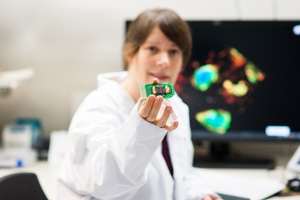Imec, a world leading nanoelectronics research center, proudly announces that Prof. Dr. Liesbet Lagae, R&D Manager Life Science Technologies at imec and professor in Nanobio Physics at KU Leuven, has been awarded a Consolidator Grant for her research project SCALPEL* by the European Research Council (ERC).

The ERC grant is the most prestigious grant for top researchers in the European Union. The grant funding, with a budget of 2 MEuro and for the duration of 5 years, will lead to the development of a high-content, high-throughput cell imaging and sorting device, that is more compact and easier to use than any existing single cell analyzer. The new device should support the work of pathologists, surgeons, and nurses and aims to improve the individualized follow-up and survival rate of cancer patients.
The single cell analyzer that Prof. Dr. Lagae and her team will develop for the SCALPEL project is based on lens free digital imaging to analyze the physical morphology of single cells flowing at high speeds through a microfluidic network with gentle cell sorting switches to route the cells towards different outlets. It thus combines the virtues of microscopic ‘high content’ imaging with the virtues of automated ‘high throughput’ single cell analysis and sorting at a fraction of the cost. Because all optomechanical components, such as lenses, detectors, and nozzles, are replaced by nanoelectronics and advanced signal processing technology, the devices will be cheap and compact.
Currently, single cell analysis remains tedious with many different instruments and protocols, typically taking a few days of intense, hands-on work. The process not only slows down research, but also hinders the translation to application in clinical practice.
Billions of dollars have been spent trying to cure primary tumors, but very little was spent in trying to detect or kill circulating tumor cells causing metastasis. Metastasis is responsible for more than 90 percent of cancer-related deaths, and originates from single circulating tumor cells, spreading via the blood stream to seed new tumors. Detection of those highly aggressive circulating tumor cells at an early stage would greatly improve the chance of survival. This is an example of an application that could greatly benefit from the ‘SCALPEL’ cell sorter. Prof. Lagae will collaborate with Prof. Deniz Wirtz from John’s Hopkins INBT and Prof. Johan Swinnen from KU Leuven’s dept. of oncology for showing the potential of the device in metastasis detection.
ERC is a flagship component of the ‘Ideas Programme’ of the European Union’s Seventh Research Framework Program (FP7). Through open competition it awards grants to projects led by top researchers in Europe. With scientific excellence being the sole criterion for selection, the ERC’s aim is to recognize the best ideas, and retain and confer status and visibility to the best brains in Europe, while also attracting talent from abroad. By challenging Europe's brightest minds, the ERC expects that its grants will help to bring about new and unpredictable scientific and technological discoveries—the kind that can form the basis of new industries, markets, and broader social innovations of the future.
*SCALPEL: Single Cell AnaLysis and Sorting Platform based on Lensfree digital imaging applied to Rapid Cancer Detection